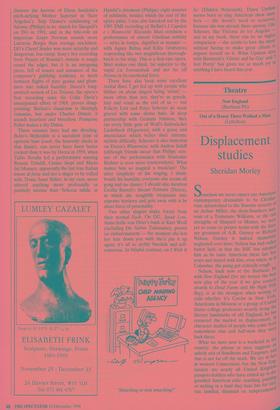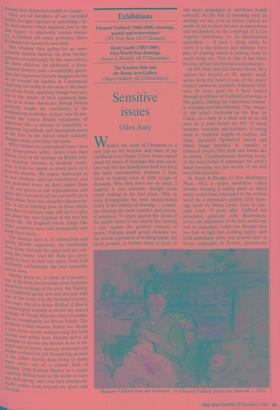Theatre
New England (Barbican Pit)
Out of a House There Walked a Man (Lyttelton)
Displacement studies
Sheridan Morley
Somehow we never expect our American contemporary dramatists to be Chekhn' vian: accustomed to the lbsenite severity ef an Arthur Miller, the deep-Southern nal' rosis of a Tennessee Williams, or the raw strengths of Shepard or Mamet, we have yet to come to proper terms with the liter- ary greatness of A.R. Gurney or Rich" Nelson. Gurney is indeed shamefullY neglected over here; Nelson has had rather better luck, in that the RSC has adopted him as its tame American these last fIV.e years and stayed with him, even when, as 10 Columbus, the going got critically rough. ., Nelson, back now at the Barbican with New England (for my money the hest new play of the year if we give comedY awards to Dead Funny and My Night WI Reg), is at his strongest when writing ° exile: whether it's Czechs in New York' Americans in Moscow or a group of United States college professors wearily doing die literary landmarks of old England, he Os. cornered the market in displacement, In character studies of people who come fro° somewhere else and half-wish they were back there. What we have now is a weekend in the country: the phrase at once suggests eild unholy mix of Sondheim and Turgenev, an , that is not far off the mark. We are in fac' in western Connecticut, but the New Eng" landers are nearly all United Kingd°.°1 passport-holders who have ended up in 41s; gruntled American exile, teaching, pani°°:' or writing in a land they hate but for vall ous familial, financial or temperament'
reasons find themselves unable to escape.
They are all members of one extended family, brought together by something a lit- tle unfortunate which happens just as the Play begins: its apparently central charac- ter, a faithless old music professor, blows his brains out across his own desk. The relatives then gather for an unex- Pectedly sudden funeral: his twin brother (played not surprisingly by the same actor), his three children, his girlfriend, a disen- chanted observer and a wonderfully queru- lous and imperious French daughter-in-law all sit around his kitchen in Connecticut Objecting not really to the man or the man- ner of his death, appalling though both are, but to the nature of their promised land. Just as in Some Americans Abroad Nelson Perfectly caught the insecurities of the backpacking academic, so here now he pin- points the classic British resentment of American life, a mixture of irritability at apparent ingratitude and incomprehension at the face in the mirror which suddenly Changes while yours stays the same. What Nelson has understood better than an. Y home-grown writer, better even than Simon Gray in his musings on British writ- ers roaming America in alcoholic confu- sion, is that we expect so much more of It than we deserve. We expect Americans to be our children, and our benefactors, and °lir perennial hosts: we don't expect them to be our guests or our replacements, and w, hen they turn nasty all we can really do is Ortch about their less attractive characteris- tics- A lot of bitching goes on here: whole speeches of inchoate rage add up to a play not about the new England of the title but about the old England where things like ,Other countries were still manageable and knew their place. The funeral here is of colonialism and
i n innate British superiority: the barbaans have come through the gates and are run-
ning the house, and the Brits are never rriing to have it their way again. Peter Gill
lhantly cast orchestrates the best ensemble in town.
Having given us, in Street of Crocodiles, One of the best and certainly most inventive theatrical evenings of the year, the Theatre de Con-iplicite group now end the year with °ne of the worst. On the National's Lyttel- t00 stage, Out of a House Walked A Man is a catastrophic attempt to do for the absurd Writings of Dariiil Kharms what Crocodiles did so triumphantly for Bruno Schulz. The Problem is that whereas Schulz was clearly a lost talent worth rediscovering for both private and public lives, Kharms defies all attempts to arouse any interest in us. A tal- ented cast of actors, dancers, musicians and
intes is therefore left floundering around
In ._.
thu (often literal) dark trying to make
sOrne sense out of a chaotic kind of nihilism. Only Kathryn Hunter as a corpse regularly flailing back to life seems to have any real energy, and even that characteris- tically comes from beyond the grave and the pale.



































































 Previous page
Previous page